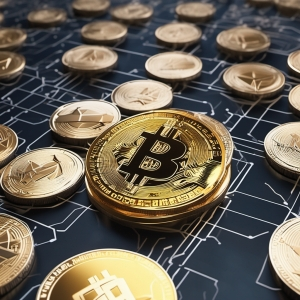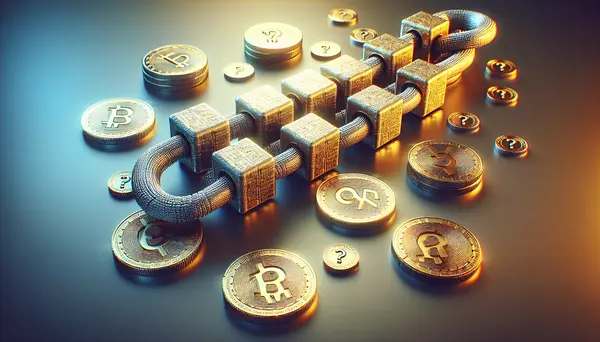Table of Contents:
Introduction: Understanding Decentralization in Cryptocurrency
The fast-paced world of cryptocurrencies can be a bewildering landscape for newcomers. A key concept to grasp, especially for those just beginning to dip their toes into this digital pool, is decentralization. It is one of the principal features that distinguish cryptocurrencies from traditional forms of money. The essence of decentralization lies in its ability to distribute power and control across a vast network, as opposed to concentrating it within a central authority or institution.
When a cryptocurrency is said to be decentralized, it essentially means its operations are not directed or managed by a single entity, be it a government, a bank or any other institution. Instead, control is diffused among numerous participants in the network, each holding equal influence. This dispersal of power is a core tenet of the blockchain technology underpinning most cryptocurrencies.
The Best Mining Providers at a Glance
» Infinity HashFrom our perspective, currently the best mining provider on the market. With the community concept, you participate in a mining pool completely managed by professionals. A portion of the earnings are used for expansion and maintenance. We've never seen this solved as cleanly anywhere else.
» Hashing24A well-known and established cloud hosting company. With a good entry point and in a good market phase, a good ROI can also be generated with some patience. Unfortunately, we see the durations as a major drawback.
But what factors determine whether or not a cryptocurrency is truly decentralized? How can a newcomer distinguish between genuinely decentralized coins and those only claiming to be? In this article, we aim to answer these questions, shedding light on the earmarks of decentralization and guiding you on your cryptocurrency journey.
Deciphering Decentralization: Key Points
The concept of decentralization tends to be applied loosely in the cryptocurrency world, which can result in misunderstandings. To truly determine whether a cryptocurrency is decentralized, it is important to consider certain critical factors.
One of these factors is the governance structure of the cryptocurrency. A truly decentralized coin should have a democratic governance system where changes to the protocol are voted upon by the community of users.
Another important aspect to examine is the distribution of coins. In a decentralized setting, the issuance of new coins should be governed by an impartial algorithm, rather than being controlled by any single player.
The network structure is also worth consideration. Decentralization implies a lack of single points of failure in the system. This is achieved when participants in the network share the responsibility of maintaining and validating the ledger of transactions.
Finally, consider the openness of the project's source code. The hallmark of a truly decentralized project is that its code is open-source, allowing anyone to audit and propose modifications.
Understanding these key points will empower you to make more informed decisions when navigating the complex waters of cryptocurrencies.
Comparison Between Decentralized and Centralized Systems
| Decentralized | Centralized |
|---|---|
| No single authority | Controlled by a single entity |
| Transactions are transparent and cannot be altered | Transactions can be manipulated by the authority |
| Higher security due to distributed network | Risk of central points of failure |
| Usually has a fixed supply; issuing rate is determined by code | Supply can be modified by the authority |
Evaluating a Cryptocurrency's Decentralization

Beyond understanding the concept of decentralization, it's crucial to also consider practical ways to evaluate the decentralized nature of a cryptocurrency. This process broadly involves checking the transparency, participation level, and autonomy of the network.
Transparency is key. For decentralization to be effective, the rules and guidelines governing the cryptocurrency should be clear, open, and accessible to everyone in the network. Look for documentation, white papers and the approach to disclosing updates and changes in the rules.
The level of participation in the network also tells a lot about a cryptocurrency's decentralization. In a highly decentralized cryptocurrency, all participants should have the ability to contribute to network decisions without any discrimination or barriers. This can be checked by examining how decisions are made and who gets to make them.
Lastly, autonomy of nodes in the network is a critical measuring stick. No single node should have a higher degree of control over the operations of the network than any other, and all nodes should operate independently. Check if all nodes have equal rights to verify transactions and add them to the blockchain.
By understanding these criteria and conducting careful evaluations, you can get a better sense of whether the cryptocurrency in question is truly decentralized.
Implications of Decentralization for Cryptocurrency Users
Decentralization is more than a mere tenet of blockchain technology; it has profound implications for those involved in the use of cryptocurrencies. Let's take a look at a few key areas.
Firstly, security is significantly bolstered in a decentralized system. Unlike a centralized database which presents an attractive target for hackers, decentralized cryptocurrencies distribute data across numerous nodes. This means that a potential attacker would need to compromise a majority of the network's nodes simultaneously to succeed, a feat which is near-impossible to pull off.
Secondly, decentralization provides a degree of immunity against censorship. In a centralized network, it's possible for an authority to restrict users' access to their own resources. However, in a decentralized cryptocurrency, you maintain control over your own assets, making it resistant to external interference.
Additionally, decentralization fosters a level of transparency that is usually absent in traditional financial systems. Given that anyone can audit the blockchain, it becomes almost impossible for fraudulent or corrupt practices to remain hidden.
Last but not least, a decentralized cryptocurrency offers the benefit of accessibility. Regardless of location or socio-economic status, anyone with an internet connection can make use of decentralized financial services. This can be especially transformative in regions that have otherwise been excluded from modern banking systems.
Understanding these implications can help novice cryptocurrency users appreciate why decentralization is such a cherished principle in the blockchain space and guide them toward suitable cryptocurrency choices.
Conclusion: The Significance of Decentralization in Cryptocurrency

In conclusion, the degree of decentralization is a fundamental aspect that shapes the identity and functionality of a cryptocurrency. Understanding it is crucial for anyone venturing into the world of digital currencies. It influences the level of security, the transparency of operations, and the degree of control users can exert within the cryptocurrency network.
Decentralization is not merely a technical feature; it's a philosophy, a democratization of digital currency that provides users with autonomy and egalitarian control, free from the constraints of traditional centralized financial systems. However, it's important to remember that not everything labeled as decentralized truly adheres to these principles, necessitating careful assessment on the part of investors and users alike.
Undeniably, as this technology continues to evolve, the conversation around what constitutes decentralization will persist. The challenge for upcoming cryptocurrencies is to maintain the ethos of decentralization while delivering secure, effective, and user-friendly platforms. The future of cryptocurrencies invariably hinges on striking this delicate balance, and staying true to the decentralized ideal will be crucial for the credibility and enduring success of digital currencies.
FAQ for "When is a cryptocurrency decentralized?"
What does it mean for a cryptocurrency to be decentralized?
A decentralized cryptocurrency is one where no central authority or entity has control over the network. It's maintained by a peer-to-peer community of computer systems—also known as nodes.
Why is decentralization important in cryptocurrency?
Decentralization is important because it eliminates the vulnerabilities inherent in a centralized system. It potentially offers more privacy and security compared to traditional financial structures.
Which cryptocurrencies are decentralized?
Most cryptocurrencies, including Bitcoin and Ethereum, are decentralized. However, the degree of decentralization may vary between different cryptocurrencies.
What are the challenges of decentralized cryptocurrencies?
Challenges include scalability problems, a higher degree of complexity, price volatility, uncertain regulatory environment, and potential for illicit activities.
How do I know if a cryptocurrency is decentralized?
You can find out by researching the technology behind the cryptocurrency, and how the decisions are made within its ecosystem. Also, cryptos without a central authority are typically decentralized.








